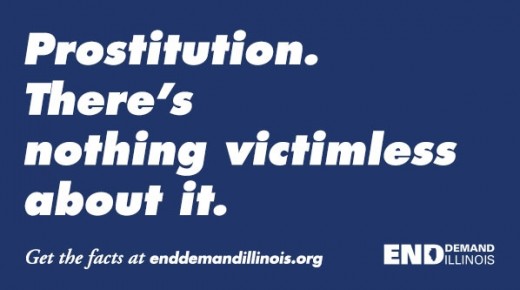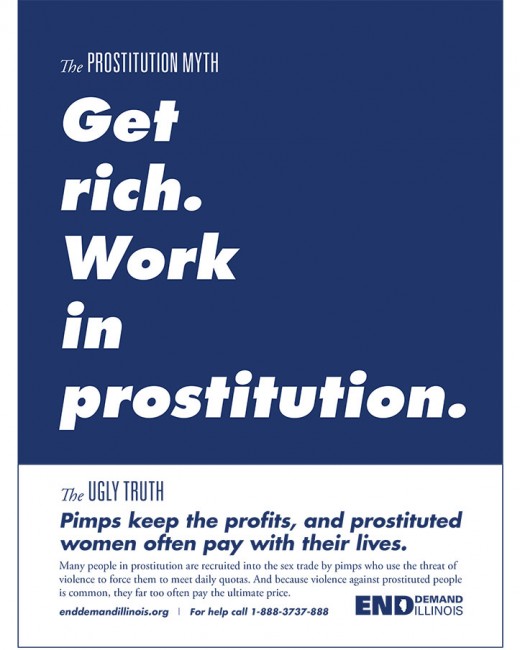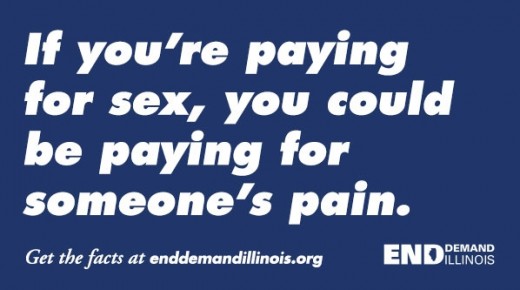Guest Post: The “Ugly Truth:” Ad Campaigns about the Sex Trade Will Always Fail…
End Demand Illinois has launched an ad campaign titled the “Ugly Truth.” Messages about the sex trade are appearing on billboards and public transportation across Chicago and perhaps also across the state. I’ve heard from several friends and colleagues who shared their thoughts and feelings about the campaign. One friend agreed to write a post that I am proud to share here on Prison Culture.
The “Ugly Truth:” Ad Campaigns about the Sex Trade Will Always Fail…
by Hadil Habiba (pen name)
I was on the bus a couple of days ago when I saw an ad that stopped me in my tracks. It read: “Prostitution. There’s nothing victimless about it.”
I felt like I was in a time machine that took me back to 1983 when conversations about the sex trade and pornography meant that no one’s life experience could be complicated- we were all just food for “feminist theory.” You know, when people spent a lot of time talking about ‘prostitutes’ and ‘prostituted people’ vs. ‘sex workers’, and acted like one of these words described everyone that trades sex for money or survival.
Those kinds of messages and thinking did not improve the lives of people in the sex trade then and won’t today either. I wondered why anyone would offer such a polarizing message. What purpose does it serve? We don’t need to polarize people’s experiences in the sex trade. We need a better understanding of those experiences in all of their complexities. I feel like I get sucked into this debate where I have to argue that lots of different parts of the sex trade exist, over and over again. What is the investment that these well-intentioned people have in erasing a significant chunk of the people they claim to represent? It’s not like there aren’t voices out there that really disagree with this message. There are many but they are usually marginalized.
I quickly Googled the rest of the ads online and found the slogans “Get rich. Work in Prostitution” and “the average age of death of a prostitute is 34″.
I felt my heart race and the triggers overwhelm me. As I sat on the bus and these messages sank in, I was horrified.
These ads presume that people involved in the sex trade are not riding public transportation. They make us invisible once again. Let’s assume that there is truth to the “fact” that the average age of death for a prostitute is 34 (and by the way this misrepresents the actual study – which reported that of the people who were in the sex trade in the study, the average age of death for that sample was 34. This is not the same thing as saying that this is true for everyone in the sex trade.). How would you experience that ad if you traded sex for money and survival needs? Would you feel triggered? Would you be frozen in place while reading the message as I was? Assuming that the “fact” asserted is true for everyone, why would you communicate with your purported constituency in this way? The ads don’t convey the three dimensional life experiences of people in the sex trade. This is unsurprising and yet still disappointing.
This led me to ask “who is the audience for these ads?” Who are the organizers of this campaign trying to communicate with? My suspicion is that their audience is people who already have a soft analysis of prostitution gleaned from watching 20/20 episodes or true crime TV shows about sex trafficking busts. But really, almost everyone thinks like this about us, because it’s an easy position to take. I mean, who is going to step up and be ‘in favor’ of ‘modern day slavery’ or ‘sex trafficking?’ And probably, that’s what people will say when they dismiss this blog post. But that’s ridiculous—and honestly—I really want to know what it’s going to take for people to actually think about how complicated the sex trade is, and that it’s not all the same, and that ads that make us all the victims of overwhelming violence don’t do anything to actually improve our circumstances.
The campaign repeats the same simple story about how the sex trade works in people’s lives. The “ugly truth” is that there are very few textbook examples of people who trade sex for money and survival needs.
The truth doesn’t have a sound bite. It’s complex. There are just as many people who are in danger in the sex trade as there are people who aren’t, and sometimes that’s the same person at different times. And even more than that— for many of us who are sometimes in danger, it is not from pimps or the traffickers or the villains in these ads—it’s from police, or parents, or other authority figures. Assuming though that there are more folks who are in danger right now than who are safe- who gains by dehumanizing and un-complicating our stories into blurbs on buses? Let’s be clear—there are people who are being trafficked, who are experiencing violence in the sex trade—and in fact I have been one of them, but these ad campaigns which assert that everyone is experiencing the same violence actually make it harder for those of us who do need dire help to be identified and understood. The person who has been trafficked and the person who has engaged consensually in the sex trade have had qualitatively different experiences. To conflate these lived experiences negates those differences and erases our uniqueness. There is no hierarchy of oppression but there are different realities that each of us live. Those realities should be honored and not labeled for us.
There is nothing about these ads that communicates survival, fighting back, self-care, or resistance. It doesn’t have our voices in it at all. We’re ‘prostituted.’ We’re not people, we’re a theory and maybe even a target. They paint a picture of a person in the sex trade who is flat, powerless, a blank slate upon whom violence is visited.
But we are not blank slates…
Somehow we get up every day- feed our kids, take care of community… and ride the bus where we see these awful ads that basically let us know that every day that we fight is worth nothing because we are on borrowed time. There is a reason why an ad campaign around this issue is always bound to fail. There isn’t a singular image that represents all of us, I can’t say that enough. The more people can wrap their heads around this, the better we will be for it. The sex trade is incredibly nuanced and a blunt instrument like the law or an ad campaign (no matter how sincere or well-intentioned) can’t address this issue. Laws and ads don’t address the root causes of the sex trade. The root causes, by the way, are stated beautifully in this report by the Young Women’s Empowerment Project – and also in this one which shows how we fight back, resist, heal, organize, educate, parent, and thrive. The “ugly truth” is that the root causes of the sex trade are about lack of jobs and housing, about racism, homophobia, transphobia, classism and misogyny.
A successful intervention in the sex trade wouldn’t focus on what the individual is doing to survive. Instead the attention and resources would be devoted to eradicating the systems that are working to keep her/him in that place. Nobody wins with simple labels. The more people try to cram us into a box, the more violence will escalate in our lives…because the structures will still be there, and if people in the sex trade don’t conform to proper victim status, we’ll be denied the support we need.
A relationship exists between messaging about people in the sex trade as victims and the violence that we experience. When our experiences get portrayed as ONLY horribly violent and we get represented as ONLY powerless, then no one is surprised when violence does happen, and no one asks for our input about how we want to end violence, because ‘everyone knows’ what happens to us.
The next morning I was on the bus and saw another ad in the same campaign which says “If you’re paying for sex, you could be paying for someone’s pain.”
The violence in my day tripled. It impacted me all day — even people who say they’re fighting for me don’t have a problem describing me as disposable, a flat object who is the subject of activism, not an empowered person with agency, an activist in my own right. And that’s the real ugly truth…



